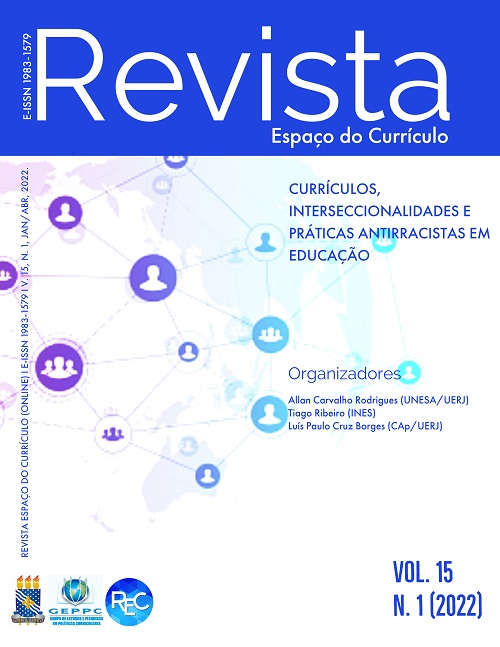THE CURRICULUM AS AN ETHNIC-RACIAL NARRATIVE
afrocentered implications for teacher education
DOI:
https://doi.org/10.15687/rec.v15i1.62557Keywords:
Afrocentricity, Single responsability, Teacher EducationAbstract
The aim is to discuss teacher education and the curriculum that structures it from an Afrocentered perspective. The curriculum is conceived in this work as a space of power and a territory of disputes that, throughout history, have been developed in a Eurocentric perspective, which makes African and Afrobrazilian knowledge invisible through epistemic practices. In this sense, the work is structured in three sections. First, we make a brief incursion into curriculum theories to apprehend the curriculum as a space in which different power relations are imbricated that, in a way, imply the silencing of knowledge and representations of an African matrix; then, we enter the epistemological territory of Afrocentricity, which arises in response to the Eurocentric paradigm, presenting the main characteristics and fundamental concepts of Afrocentric theory; finally, in the third section, we present reflections for the development of the curriculum and teacher education in an Afrocentered perspective.
Downloads
Metrics
References
ALMEIDA, Carla Verônica Albuquerque. Currículo afrocentrado: implicações para a formação docente. Revista Sul-Americana de Filosofia e Educação (RESAFE), n. 31, p. 71 86, 17 nov. 2019. Disponível em: https://periodicos.unb.br/index.php/resafe/article/view/28257/24240. Acesso em: 15 jul. 2021.
ARROYO, Miguel. Currículo, território em disputa. Petrópolis, RJ: Vozes, 2013.
ASANTE, Molefi Kete. Afrocentricidade: notas sobre uma posição disciplinar. In: NASCIMENTO, Elisa Larkin. Afrocentricidade: uma abordagem epistemológica inovadora. São Paulo: Selo Negro, 2009, p. 93-110.
BARRETO, Vanda Sá. Escola Plural e Políticas Públicas. In: LIMA, Maria Nazaré Mota de. Escola Plural: a diversidade está na sala; Formação de Professores/as em História e Cultura Afro-Brasileira e Africana. São Paulo: Cortez, Brasília: UNICEF, 2012.
BRASIL. Plano Nacional de Implementação das Diretrizes Curriculares Nacionais para Educação das Relações Etnicorraciais e para o Ensino de História e Cultura Afro-brasileira e Africana. Brasília, DF, 2009. Educação, Secretaria de Educação Continuada, 2008.
GOMES, Nilma Lino. Relações étnico-raciais, educação e descolonização dos currículos. Currículo Sem Fronteira, v. 12, n. 1, p. 98-109, jan./abr. 2012. Disponível em: http://www.apeoesp.org.br/sistema/ck/files/5_Gomes_N%20L_Rel_etnico_raciais_educ%20e%20descolonizacao%20do%20curriculo.pdf. Acesso em: 15 jul. 2021.
GOMES, Nilma Lino; MARTINS, Araci Alves. História da África e das Culturas Afro-Brasileiras: a construção dos plurais. In: DALBEN, Ângela Imaculada Loureiro de Freitas; GOMES, Maria de Fátima Cardoso (Orgs.). Formação Continuada de docentes da educação básica: construindo parcerias. Belo Horizonte: Autêntica, 2009.
GONÇALVES, Luiz Alberto Oliveira. O silêncio: um ritual pedagógico a favor da discriminação racial: um estudo acerca da discriminação racial como fator de seletividade na escola pública de primeiro grau: 1º a 4º série. 1985, 250 p. (Dissertação, mestrado em educação). Programa de pós-graduação em educação conhecimento e inclusão social. Universidade Federal de Minas Gerais, Belo Horizonte, 1985.
LOPES, Alice Casimiro. Discursos nas políticas de currículo. Currículo sem Fronteiras, v. 6, p. 33-52, 2006.
LOPES, Alice Casimiro; MACEDO, Elizabeth. Teorias de currículo. São Paulo: Cortez, 2011.
MAZAMA, Ama. A afrocentricidade como um novo paradigma. In: NASCIMENTO, Elisa Larkin. Afrocentricidade: uma abordagem epistemológica inovadora. São Paulo: Selo Negro, 2009, 111-128.
MENESES, Maria Paula. “Os Espaços Criados pelas Palavras — racismos, etnicidades e o encontro colonial”. In: GOMES, Nilma (org.). Formação de Professores e Questão Racial. Belo Horizonte: Autêntica, 2007.
MOREIRA, Antônio Flávio Barbosa; TADEU, Tomaz. Sociologia e teoria crítica do currículo: uma introdução. In: MOREIRA, Antônio Flávio; TADEU, Tomaz (Orgs.). Currículo, cultura e sociedade. 12. ed. São Paulo: Cortez, 2013, p. 13-48.
MÜLLER, Tania Mara Pedroso. Livro didático, Educação e Relações Étnico-raciais: o estado da arte. Educ. Rev., v. 34, n. 69, p. 77-95, 2018. Disponível em: https://www.scielo.br/j/er/a/q8Fc6KBmPsnWp6h9kh5mhtG/?lang=pt. Acesso em: 20 ago. 2021.
MÜLLER, Tânia Mara Pedroso; COELHO, Wilma de Nazaré Baía. A Lei no. 10.639/03 e a Formação de Professores: trajetória e perspectivas. Revista da ABPN, v. 5, n. 11, jul.– out. p. 29-54. 2013. Disponível em: https://redib.org/Record/oai_articulo2210198-a-lei-no-1063903-e-a-forma%C3%A7%C3%A3o-de-professores-trajet%C3%B3ria-e-perspectivas. Acesso em: 20 ago. 2021.
MUNANGA, Kabengele. Superando o Racismo na Escola. 2. ed. revisada. Brasília: MEC; SECAD, 2005.
SANTOS, Boaventura de Sousa; MENESES, Maria Paula. (Orgs.) Epistemologias do Sul. São Paulo; Editora Cortez. 2014.
SANTOS, Elisabete Figueroa dos; PINTO, Eliane Aparecida Toledo; CHIRINÉA, Andréia Melanda. A Lei nº 10.639/03 e o Epistemicídio: relações e embates. Educ. Real., Porto Alegre, v. 43, n. 3, p. 949-967, set. 2018. Disponível em: https://www.scielo.br/j/edreal/a/JXQP9M8NVGb6cCFH4hZwgFC/abstract/?lang=pt. Acesso em: 3 set. 2021.
SILVA, Tomaz Tadeu da. Documentos de Identidade: Uma Introdução às Teorias de Currículo. 3 ed., 12. reimp. Autêntica Editora, 2019.
TARDIF, Maurice. Saberes docentes e formação profissional. Petrópolis: Vozes, 2014.
Downloads
Published
How to Cite
Issue
Section
License
Copyright (c) 2022 Curriculum Space Journal

This work is licensed under a Creative Commons Attribution 4.0 International License.
By submitting an article to Curriculum Space Journal (CSJ) and having it approved, the authors agree to assign, without remuneration, the following rights to Curriculum Space Journal: first publication rights and permission for CSJ to redistribute this article. article and its metadata to the indexing and reference services that its editors deem appropriate.
















